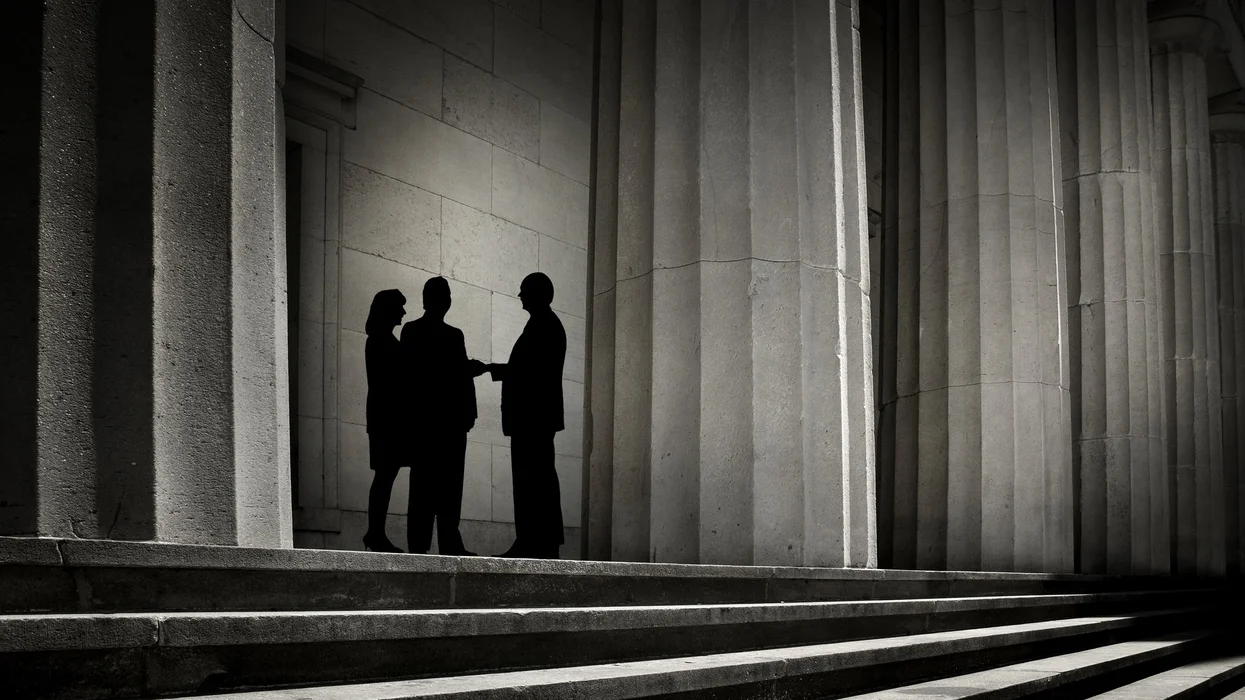
© 2025 Blaze Media LLC. All rights reserved.
In an attempt to justify their ever-expanding socialist agenda in America and the free world, the secular progressives will misrepresent biblical truth. Isn’t it amazing how often anti-God, anti-Christian people use the Word of the God they reject in an attempt to legitimize their illegitimate goals? Of course Satan used this tactic in the Garden of Eden to deceive Adam and Eve (see Genesis 3). The father of lies also tricked Israel into selling their lives, souls, freedom, and future to Pharaoh, which resulted in bondage.
Even while living in the Promised Land of blessings and prosperity, Israel decided they needed a king to rule over them so they could be like other foolish nations. History has recorded the tragic results of not keeping God in first place. Unless true believers wake up and stand up fearlessly and faithfully, here we go again! Let’s address the assertion some liberals and secularists are making that the New Testament church was communist.
Look carefully at this text from the book of Acts:
Now the whole group of those who believed were of one heart and soul, and no one claimed private ownership of any possessions, but everything they owned was held in common.…There was not a needy person among them, for as many as owned lands or houses sold them and brought the proceeds of what was sold. They laid it at the apostles‘ feet, and it was distributed to each as any had need. (Acts 4:32–35)
This was the first church to form after the gift of the Holy Spirit at Pentecost. The church was formed in the city of Jerusalem. Acts says that these believers were “filled with the Holy Spirit and spoke the word of God boldly” (Acts 4:31). If this is communism, it would be a big deal. But “communism” is not just a big word for “sharing.” Communism in its modern form treats private property rights as a system that oppresses the poor. It is based on Karl Marx‘s theory of class warfare, in which the capitalists (bourgeoisie) slowly extract most of the wealth from the workers (proletarians), at which point the workers revolt against the capitalists—those who own the means of production—and forcibly take control of the means of production, that is, productive property. The state becomes the owner of all property on behalf of the workers, but eventually, this socialist state withers away and a communist utopia emerges where everyone is free and has everything he or she needs.
There‘s not one word about bourgeoisie or proletarians in Acts. Private property is not condemned for oppressing the poor. These early Christians are selling their possessions and sharing freely and spontaneously. The state isn‘t confiscating anything. No one is coercing or being coerced. The church in Jerusalem had no political or economic power. The early church in Jerusalem is nothing like the modern communist state. The New Testament believers were perfect illustrations of what it looks like to love God with all your heart and love your neighbor as yourself. Sharing was clearly voluntary, not compulsory. If you‘re being compelled to share, you‘re getting mugged.
Neither does what happens later in the book of Acts with Ananias and Sapphira confirm a communist reading of this text. At first glance, it appears that Peter condemns the couple for keeping back some of the money they got from selling their land. “Ananias,” Peter asks, “why has Satan filled your heart to lie to the Holy Spirit and to keep back part of the proceeds of the lands?” A few seconds later, Ananias is dead on the floor, apparently struck dead by God. You might think Ananias was condemned because he didn't give up everything he owned, that ownership was a violation of community rules; but study the rest of Peter‘s statement: “While [your lands] remained unsold, did it not remain your own? And after it was sold, were not the proceeds at your disposal? How is it that you have contrived this deed in your heart? You did not lie to us but to God!” (Acts 5:3-4).
Peter says outright that the property was rightfully theirs, and so was the money they got from selling it. Private property is clearly not the problem. Peter condemns Ananias and Sapphira not for keeping back part of the proceeds of the sale, but for lying about it.
The communal life of the early church in Jerusalem is never made the norm for all Christians everywhere. The early chapters of Acts describe a unique situation—the very beginning of the church in Jerusalem. Churches in other cities appeared after the gospel was preached by Paul or one of the other apostles. The church at Corinth was made up of Corinthians. The church at Galatia was made up, we can assume, of Galatians. The day of Pentecost in Jerusalem was quite different. On that occasion, Peter preached the gospel to thousands of Jews who had come to Jerusalem from all around the Roman Empire, speaking various languages. And this was no ordinary sermon. When Peter preached, the Holy Spirit descended with such power that flames of fire appeared on the heads of the gathered, and they began communicating in languages they didn't know, while hearing foreigners speak meaningfully to them in their own language.
Thousands were added to the Church on this one day. Normally, Jews visiting Jerusalem would return home after the holiday since they were away from their jobs, extended families, and homes. Now suddenly they were part of a brand-new community. New Christians needed to stay in Jerusalem much longer than expected in order to be properly discipled; thus, the local believers began selling their property so they could share with these new, temporarily displaced brothers and sisters. They were in a unique and short-term situation. At some point, many of the new Jewish Christians returned to their homes, taking their faith with them.
Other churches in other cities did things differently. When some Thessalonian Christians took advantage of the generosity of fellow believers, Paul ordered them to earn their own living. He even laid down a stern rule: “Anyone unwilling to work should not eat” (2 Thessalonians 3:10, 12). The apostle was not for one moment implying that we should not help the helpless. He was warning people not to exploit the generosity of others and emphasizing the importance of personal responsibility.
In short, communism and training people to develop an entitlement mentality is not the Christian ideal. Every true believer and freedom loving person in America should diligently seek ways to effectively assist the poor, suffering, downtrodden and those challenged by aging. The answers will not be found in socialism, communism or any other program that destroys freedom, responsibility, accountability and expressions of genuine compassion. We can find realistic, sensible, effective answers for every challenge we face including health, energy, immigration, and the economy. But unless people who understand God’s truth begin to apply unshakable principles and work together, the blessings of freedom we have enjoyed will soon come to a screeching halt.
Much of this commentary was adapted from the book INDIVISIBLE which can be ordered through www.indivisiblebook.com or by www.lifetoday.org. The importance of working together to address common concerns was effectively discussed on Thursday’s “LIFE Today” program when special guests David Barton and Glenn Beck joined James and Betty. Under God INDIVISIBLE conferences will be held soon with James Robison, Jay Richards and other concerned leaders. See www.undergodindivisible.org for dates and locations.
James Robison and Glenn Beck will be speaking at Skyline Church in San Diego on Sunday, April 22. There is no charge to attend. See website for details: https://www.skylinechurch.org.
Want to leave a tip?
We answer to you. Help keep our content free of advertisers and big tech censorship by leaving a tip today.
Want to join the conversation?
Already a subscriber?
more stories
Sign up for the Blaze newsletter
By signing up, you agree to our Privacy Policy and Terms of Use, and agree to receive content that may sometimes include advertisements. You may opt out at any time.
Related Content
© 2025 Blaze Media LLC. All rights reserved.
Get the stories that matter most delivered directly to your inbox.
By signing up, you agree to our Privacy Policy and Terms of Use, and agree to receive content that may sometimes include advertisements. You may opt out at any time.





